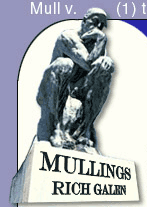|
|

|


Lede Changes in the
Presidential Race
Rich Galen
Monday July 27, 2015
 Twitter Twitter
Click here for an Easy Print Version
Among reporters of a certain age, the opening paragraph of a news story is known as the "lede" (pronounced leed).
Why it not simply spelled "leed" is unknown to me, but I do know it is not spelled "lead" (leed) because back in the day, when typesetting machines (called "linotypes") used lead (led) it was useful to avoid the obvious confusion.
If that hasn't confused you enough I went through all of that because you might have seen the flame wars that broke out over a change in the lede of a story about Hillary Clinton's emails, two Inspectors General, and the FBI.
In an early email version of a story the New York Times sent out the lede was this, from the DailyKos.com - all the emphases are from the website:
Two inspectors general have asked the Justice Department to open a criminal investigation into whether Hillary Rodham Clinton mishandled sensitive government information on a private email account she used as secretary of state, senior government officials said Thursday.
The Daily Kos goes on to write, "Here's the lede as it was rewritten - in dramatic fashion - an hour later"
Two inspectors general have asked the Justice Department to open a criminal investigation into whether sensitive government information was mishandled in connection with the personal email account Hillary Rodham Clinton used as secretary of state, senior government officials said Thursday.
The Daily Kos is an unabashedly liberal web site - I didn't want you to think only Fox News and the Daily Beast were huffing and puffing about this.
This is not a column about what Hillary knew or what Hillary did, and when she knew or did it.
This is a good opportunity to talk about the odd relationship that exists among reporters and the communications staffs of the people reporters cover.
What apparently happened overnight Thursday was someone on the Clinton staff called someone on the New York Times staff and complained that the original lede was incorrect in that Hillary Clinton was not being accused of mishandling sensitive government data.
That would be the equivalent of, "I made a mistake."
What the campaign was demanding was the Times recast the lede to the equivalent of: "Mistakes were made."
This back and forth between reporters and comms staff goes on all the time. It is often helpful in getting the story right - which usually benefits both parties.
Just because a senior communications person calls a reporter or editor, doesn't mean the requested changes will be made. In my career, I have sometimes been able to have a story corrected, sometimes the reporter has disagreed with my interpretation of the facts and has left it as is.
The secret to these conversations is that there has to be a level of trust between the parties. I had to trust the reporter not to disclose the nature of our discussions - they were off the record. The reporter had to trust me not to hold him/her or their publication up to public scorn for correcting whatever I thought needed fixing.
No legitimate reporter wants to be shown up by writing and publishing (or taping and broadcasting) something that is wrong. These discussions are rarely black-and-white: You said my boss did A while on a Congressional trip and he didn't. He wasn't even on that trip. He had dropped out a few days before.
That's an easy one.
The issue is more likely to be: My boss was on that trip, and what you said happened did, in fact, happen, but it was approved in advance by the House Ethics Committee which has since reviewed, and renewed, its approval.
Tougher call for the reporter.
In this case, the Times published not one, but two corrections including a pretty important one that the Inspectors General had not asked for a criminal referral, but a "security referral."
Here is the lede of the tidied up version of the Hillary Clinton email story published on the New York Times' website on Friday:
"Government investigators said Friday that they had discovered classified information on the private email account that Hillary Clinton used when she was Secretary of State, stating unequivocally that those emails should never have been stored outside of secure government computer systems."
The Clinton comms folks did their job.
On the Secret Decoder Ring today: Links to the history of the linotype then to (a) the Daily Kos look at the two ledes, (b) the full NY Times story with the corrected lede, and (c) the cleaned up NY Times piece published later Friday.
A really pretty Mullfoto taken Sunday morning after a terrific wedding we attended in Dallas.
-- END --
Copyright © 2015 Barrington Worldwide, LLC
Become a
Paid Mullings Subscriber!
(To join the FREE mailing list or to unsubscribe Click Here)

Current Issue |
Secret Decoder
Ring | Past
Issues | Email
Rich | Rich
Who?
Copyright �2013 Barrington Worldwide, LLC | Site design by Campaign
Solutions. | |
|



